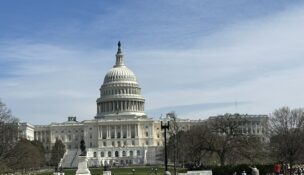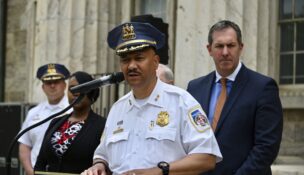Formal negotiations go by wayside under collective bargaining law
By: Associated Press//September 22, 2011//
Formal negotiations go by wayside under collective bargaining law
By: Associated Press//September 22, 2011//
By SCOTT BAUER
Associated Press
MADISON, Wis. (AP) – Wisconsin will no longer be obligated to bargain with its largest public employee unions after the weakened labor groups decided Thursday against seeking recertification votes in the state at the forefront of this year’s fight over union rights.
The unions representing about 50,000 workers opted not to file notice of an intention to hold the complicated and expensive votes required by Republican Gov. Scott Walker’s sweeping collective bargaining changes passed by lawmakers earlier this year. The unions still will be able to request informal talks with state agencies, but formal negotiations will go by the wayside.
Salary increases no greater than inflation was only item that even remained subject to bargaining under the state’s new law, which took effect after months of divisive political wrangling and massive protests at the state Capitol. Unions lost the power to negotiate other issues like workplace safety standards, vacations and health care benefits — all of which had been subject to collective bargaining since Wisconsin became the first state to require it in 1959.
Labor leaders and lawmakers said they still hoped informal talks would continue.
“Prior to 1959 there wasn’t official recognition and unions were very engaged in the workplace,” said Bryan Kennedy, president of the 17,000-member American Federation of Teachers-Wisconsin. “The most important thing is unions are going to do what they did prior to 1959 and that is we’re going to be the watchdogs for waste, fraud and abuse in these agencies.”
Showing power through numbers — either in support or opposition to employer proposals — will be the model until unions win back the power to bargain a contract, Kennedy said.
“I’m confident we’re going to continue to be a squeaky wheel,” he said.
Experiences in other states without collective bargaining show public employees can still successfully work with employers to achieve their goals, said Paul Secunda, a labor law professor and program coordinator for the Marquette Labor and Employment Law Program in Milwaukee. He also called the Wisconsin unions’ decision not to pour resources into the recertification votes a “smart move.”
“It doesn’t have the bells and whistles of formal recognition. But what you do have is strength in numbers. It’s only going to be the most callous state employer that ignores that,” Secunda said. “The problem is, beyond consideration, there is no stick backed up by the law to force them to do anything.”
Unions in states without collective bargaining, such as Virginia and North Carolina, often turn to lobbying state legislatures and local governments when they can’t reach informal deals to get what they want, said Ann Hodges, a labor law professor at the University of Richmond Law School in Virginia.
“I’m sure there’s going to be a lot of trial and error,” Hodges said of Wisconsin. “I think the benefit from the unions’ point of view is you’re not in the South. You have this tradition of unionization.”
Republican state Rep. Robin Vos, who employs 20 non-union workers at a food packaging business and was a staunch supporter of Walker’s collective bargaining plan, said he expects there will be informal talks with state employees.
“It’s common sense to say we’re going to talk with employees as a state,” Vos said.
Democratic state Sen. Chris Larson of Milwaukee, one of 14 senators who fled to Illinois this summer in a vain attempt to block passage of the bill, said holding even informal talks with state employees would lead to a feeling of disenfranchisement among workers and raise the risk of serious job actions like strikes.
Walker’s spokesman, Cullen Werwie, had no comment Thursday on unions’ decision not to seek recertification votes.
In addition to requiring the votes to maintain certification, the new law also bans automatic dues withdrawal from union members’ pay checks, forcing them to voluntarily contribute.
Union leaders have refused to say how many members are voluntarily paying dues. The statewide teachers union, the Wisconsin Education Association Council, announced in August it was laying off 42 people – 40 percent of its staff — as a cost-savings step.
Jeff Richter, a union member and analyst for the Public Service Commission, said he will continue to pay roughly $50 a month in dues and most of the 58 members of his unit also are voluntarily contributing.
“If your union is very active and you feel a part of it, there isn’t a question in your mind why you would do this,” he said.
Marty Beil, executive director of the 23,000-member Wisconsin State Employees Union representing largely blue-collar workers, told the Milwaukee Journal Sentinel that none of the units in his group will seek recertification. He did not immediately return a message to The Associated Press on Thursday seeking comment.
Some small groups under the larger union umbrellas — including trade, local government and small school district unions – are opting to hold recertification votes.
But Kennedy said a recertification vote would have been cumbersome and cost up to $1 million for all AFT Teachers members. The new law requires a majority of all covered workers, not just those casting ballots, to approve in order for a union to remain certified.
Legal News
- Wisconsin Attorney General asks Congress to expand reproductive health services
- Attorney General Kaul releases update at three-year anniversary of clergy and faith leader abuse initiative
- State Bar leaders remain deeply divided over special purpose trust
- Former Wisconsin college chancellor fired over porn career is fighting to keep his faculty post
- Pecker says he pledged to be Trump campaign’s ‘eyes and ears’ during 2016 race
- A conservative quest to limit diversity programs gains momentum in states
- Wisconsin prison inmate pleads not guilty to killing cellmate
- Waukesha man sentenced to 30 years for Sex Trafficking
- 12-year-old shot in Milwaukee Wednesday with ‘serious injuries’
- Milwaukee man convicted of laundering proceeds of business email compromise fraud schemes
- Giuliani, Meadows among 18 indicted in Arizona fake electors case
- Some State Bar diversity participants walk away from program
WLJ People
- Power 30 Personal Injury Attorneys – Russell Nicolet
- Power 30 Personal Injury Attorneys – Benjamin Nicolet
- Power 30 Personal Injury Attorneys – Dustin T. Woehl
- Power 30 Personal Injury Attorneys – Katherine Metzger
- Power 30 Personal Injury Attorneys – Joseph Ryan
- Power 30 Personal Injury Attorneys – James M. Ryan
- Power 30 Personal Injury Attorneys – Dana Wachs
- Power 30 Personal Injury Attorneys – Mark L. Thomsen
- Power 30 Personal Injury Attorneys – Matthew Lein
- Power 30 Personal Injury Attorneys – Jeffrey A. Pitman
- Power 30 Personal Injury Attorneys – William Pemberton
- Power 30 Personal Injury Attorneys – Howard S. Sicula











